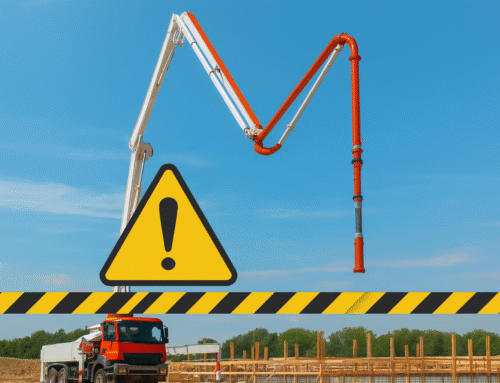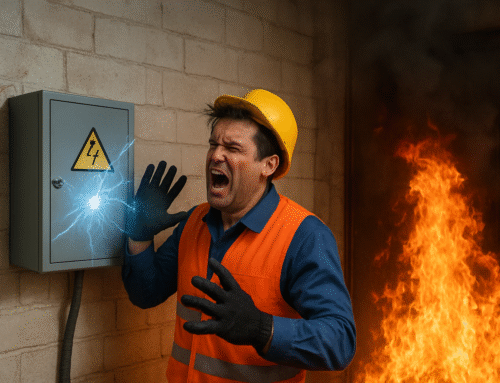Duties of a person conducting a business or undertaking (PCBU)
The work health and safety (WHS) laws require a person conducting a business or undertaking (PCBU) to ensure, so far as is reasonably practicable, the health and safety of their workers while at work in the business or undertaking. This includes:
– The provision and maintenance of a work environment without risks to health and safety
– The provision and maintenance of safe plant and structures
– The provision and maintenance of safe systems of work
– The safe use, handling, storage and transport of plant, structures and substances
– The provision of adequate facilities for the welfare at work of workers in carrying out work for the business or undertaking, including ensuring access to those facilities
– The provision of any information, training, instruction or supervision that is necessary to protect all persons from risks to their health and safety arising from work carried out as part of the conduct of the business or undertaking
– That the health of workers and the conditions at the workplace are monitored for the purpose of preventing illness or injury of workers arising from the conduct of the business or undertaking.
If a worker occupies accommodation owned by or under the management and control of the PCBU because other accommodation is not reasonably available, the PCBU must, so far as is reasonably practicable, maintain the premises so that the worker occupying the premises is not exposed to risks to health and safety.
Other duty holders are persons conducting a business or undertaking who are:
– Persons with management or control of a workplace
– Persons with management or control of fixtures, fittings or plant at a workplace
– Designers of plant, substances or structures
– Manufacturers of plant, substances or structures
– Importers of plant, substances or structures
– Suppliers of plant, substances or structures
– Persons who install, construct or commission plant or structures.
Officers
An officer has a duty to exercise due diligence to ensure that their organisation complies with the WHS laws. An officer can be found guilty of an offence regardless of whether the organisation has been found guilty.
In particular, the WHS laws impose a specific duty on officers of corporations and unincorporated bodies such as clubs and associations to exercise due diligence to ensure that the corporation, club or association meets its work health and safety obligations. This requires officers to be proactive in ensuring that the corporation, club or association complies with its duties.
A volunteer officer cannot be prosecuted for failing to comply with their officer duties under the Work Health and Safety Act 2011 (PDF, 1.42 MB) (WHS Act). This immunity from prosecution is designed to ensure that voluntary participation at the officer level is not discouraged. A volunteer officer can however, be prosecuted in their capacity as a worker if they fail to meet their duties as a worker under the WHS Act.
Workers
‘Workers’ includes any person who carries out work, in any capacity, for a person conducting a business or undertaking. Workers must:
– Take reasonable care for their own health and safety
– Take reasonable care that their conduct does not adversely affect the health and safety of others
– Comply, so far as they are reasonably able with instructions
– Cooperate with reasonable health and safety policies or procedures that have been notified to workers.
Other persons at the workplace
– A person at a workplace, whether or not the person has another duty under this part must:
– Take reasonable care for his or her own health and safety
– Take reasonable care the his or her acts or omissions do not adversely affect the health and safety of other persons
– Comply, so far as the person is reasonably able, with any reasonable instruction that is given by the person conducting the business or undertaking.
Due diligence
The Work Health and Safety Act 2011 (the WHS Act 2011) imposes a specific duty on officers of corporations and unincorporated bodies, such as clubs and associations, to exercise due diligence to ensure that the corporation, club or association meets its work health and safety obligations. The duty requires officers to be proactive in ensuring that the corporation, club or association complies with its duty.
This is different to the situation that existed under the Workplace Health and Safety Act 1995 (WHS Act), where corporate officers are deemed to be liable for health and safety offences committed by their corporation unless they can show that they exercised proper diligence to ensure that the corporation complied with the WHS Act, or that they were not in a position to influence the conduct of the corporation regarding the offence under the WHS Act.
This duty under the WHS Act 2011 applies whether or not there has been an incident and irrespective of whether the corporation is prosecuted (e.g. a work health and safety inspector may, during a routine audit or inspection, ask a corporate director to produce evidence that the director is meeting his or her due diligence requirements. If satisfactory evidence is not produced, the inspector may issue the director with an improvement notice. If the failure to demonstrate due diligence is serious, reckless or flagrant, the inspector might commence prosecution proceedings against the director).
What is due diligence?
Due diligence in relation to ensuring health and safety is defined for the first time in the WHS Act 2011. In demonstrating due diligence, officers will need to show that they have taken reasonable steps to:
– Acquire and update their knowledge of health and safety matters
– Understand the operations being carried out by the person conducting the business or undertaking in which they are employed, and the hazards and risks associated with the operations
– Ensure that the person conducting the business or undertaking has, and uses, appropriate resources and processes to eliminate or minimise health and safety risks arising from work being done
– Ensure that the person conducting the business or undertaking has appropriate processes in place to receive and respond promptly to information regarding incidents, hazards and risks
– Ensure that the person conducting the business or undertaking has, and uses, processes for complying with duties or obligations under the WHS Act 2011.
This approach emphasises the corporate governance responsibilities of officers. It is critical to the achievement of positive safety outcomes for senior management to lead the corporate safety agenda.
Demonstrating Due Diligence
The due diligence criteria listed in the WHS Act 2011 are shown below, with suggestions on how to meet them.
1. Acquiring knowledge of health and safety issues
This can be met by:
– Acquiring up-to-date knowledge of the WHS Act 2011, regulations and codes of practice
– Investigating current industry issues through conferences, seminars, information and awareness sessions, industry groups, newsletters
– Acquiring up-to-date knowledge of work health and safety management principles and practices
– Ensuring that work health and safety matters are considered at each corporation, club or association board meeting.
2. Understanding operations and associated hazards and risks
This can be met by:
– Developing a plan of the operation that identifies hazards in core activities
– Ensuring that information is readily available to other officers and workers about procedures to ensure the safety of specific operations that pose health and safety risks in the workplace
– Continuously improving the safety management system.
3. Ensuring that appropriate resources and processes are used to eliminate or minimise risks to health and safety
This can be met by:
– Establishing/maintaining safe methods of work
– Implementing a safety management system
– Recruiting personnel with appropriate skills, including safety personnel
– Ensuring staffing levels are adequate for safety in operations
– Giving safety personnel access to decision makers for urgent issues
– Maintaining/upgrading infrastructure.
4. Implementing processes for receiving and responding to information about incidents, hazards and risks
This can be met by:
– Employing a risk management process
– Having efficient, timely reporting systems
– Empowering workers to cease unsafe work and request better resources
– Establishing processes for considering/ responding to information about incidents, hazards and risks in a timely fashion
– Measuring against positive performance indicators to identify deficiencies (e.g. percentage of issues actioned within agreed timeframe).
5. Establishing and maintaining compliance processes
This can be met by:
– Undertaking a legal compliance audit of policies, procedures and practices
– Testing policies, procedures and practices to verify compliance with safety management planning.
6. Verifying the provision and use of the resources mentioned in 1-5.
– Officers will need to ensure there is a system in place that records and provides evidence of the matters mentioned in 1-5.
– Accessing up to date safety information
As part of due diligence requirements, officers need up-to-date knowledge about safety issues. They must also ensure that their employer and workers have ready access to information that will help them to avoid risks and hazards in the workplace.
Retaining trained safety advisors
State government departments, Government Owned Corporations and Statutory Authorities are all required to retain trained safety advisors under the policy ‘Engaging trained safety advisors to meet due diligence requirements in government’ (PDF, 121 kB).
There are also advantages for businesses and undertakings in retaining a trained safety advisor (although not mandatory) to assist an officer to satisfy their due diligence obligations.
Maintaining a role for a trained safety advisor will:
– Promote a positive work health and safety culture by sending a clear message that health and safety is valued by the business
– Support officers in meeting their due diligence requirements
– Ensure safety information is updated
– Be a cost effective way of demonstrating due diligence.
However, it is important to note the duty to exercise due diligence will always remain with the officer and cannot be outsourced or delegated to a trained safety advisor. Employing a trained safety advisor is only one option to help officers meet their duties.
Training for safety advisor
The voluntary retention of a trained safety advisor is best supported by at least Vocational Education and Training accredited training in order to provide safety officers with a nationally recognised formal qualification.
It will also be important for trained safety advisors to update their skills and knowledge periodically to ensure they have knowledge of current workplace health and safety legislation and initiatives.
Consultation
There is a duty to consult with your workers and consult with other duty holders at the same workplace.
Duty to consult with other duty holders
There are often a number of different duty holders involved in workplaces (e.g. suppliers, contractors and building owners). The Work Health and Safety Act 2011 (PDF, 1.42 MB) (WHS Act) requires that where more than one person has a duty for the same matter, each person retains responsibility for their duty and must discharge the duty to the extent to which the person can influence and control the matter.
In these situations the WHS Act requires that each person with a duty must, so far as is reasonably practicable, consult, cooperate and coordinate activities with all other persons who have a work health and safety duty for the same matter. Each duty holder must share information in a timely manner and cooperate to meet health and safety obligations.
The duty requires persons conducting a business or undertaking (PCBUs) to work together in a proactive and reciprocal way so that all risks associated with an activity, that they are involved in, are eliminated or minimised so far as is reasonably practicable.
Duty to consult with workers
The WHS Act requires duty holders to consult, so far as is reasonably practicable, with their workers who are likely to be directly affected by a matter relating to work health and safety.
Consultation is a collaborative process between the PCBU and workers. It involves sharing information about health and safety. PCBUs must give workers who are, or are likely to be, directly affected by a matter relating to health and safety, a reasonable opportunity to express their views or raise issues. If a health and safety representative representing workers, the consultation must involve them.
A PCBU must consult with workers when:
– Identifying hazards and assessing risks arising from work
– Proposing changes that may affect the health and safety of workers
– Carrying out activities prescribed by the Work Health and Safety Regulation 2011 (PDF, 2.53 MB).
A PCBU must also consult with workers and take their views into account when making decisions about:
– Ways to eliminate or minimise risks
– The adequacy of facilities for workers’ welfare
– Procedures for consulting workers
– Resolving health and safety issues
– Monitoring the health and safety of workers or workplace conditions
– How to provide health and safety information and training to workers.
Workers are entitled to:
– Elect a health and safety representative
– Request the formation of a health and safety committee
– Cease unsafe work
– Have health and safety issues resolved in accordance with an agreed issue resolution procedure
– Not be discriminated against for raising health and safety issues.
General working environment (workplace facilities)
A person conducting a business or undertaking (PCBU) at a workplace must ensure that the following is provided and maintained, so far as is reasonably practicable, without risk to a persons health and safety:
– A means of entry, exit and movement within workplace
– A work space
– Floors and surfaces designed, installed and maintained for the tasks being undertaken
– Adequate lighting to enable each person to carry out work, move within workplace and evacuate in an emergency
– Ventilation
– Control of risks associated with extremes in temperatures
– Control of risks associated with essential services
– Adequate facilities for workers (inc include toilets, drinking water, washing and eating facilities), maintained in good working order and clean, safe and accessible.
The requirements for workplace facilities may vary from one workplace to the next depending on the nature of the work carried out at the workplace, the types of hazards present, the size, location and nature of the workplace and the number and composition of workers at the workplace. All these factors should be taken into account by a PCBU in deciding the provision and maintenance of adequate and accessible facilities.
View the Managing the Work Environment and Facilities Code of Practice 2011.
Managing risks from airborne contaminants
– A PCBU must ensure that no one at the workplace is exposed to a substance or mixture in an airborne concentration which exceeds its exposure standard.
– A PCBU must ensure that air monitoring is conducted to determine if the airborne concentration of the substance or mixture at the workplace if the PCBU is uncertain whether the exposure standard has been exceeded or whether there is a risk to health. If monitoring is conducted, the results must be recorded and retained for 30 years and be accessible to persons exposed at the workplace.
Managing chemicals
Keep in mind the health and safety of yourself and others when cleaning up chemical spills, especially if it is a chemical concentrate. The safety data sheet (SDS) gives information for cleaning up a chemical spill.
Each chemical has an identification code, called a UN number (a four digit number assigned by the United Nations to identify dangerous goods), which you can find stamped on the container or on its label. It is also found on the relevant SDS. If you call an emergency number to report a chemical incident, supply them with the UN number.
Try to contain a chemical spill so that it does not get into a watercourse or storage facility.
Hazardous atmospheres
A duty holder must manage risks associated with a hazardous atmosphere. An atmosphere is a hazardous atmosphere if:
– The atmosphere does not have a safe oxygen level (e.g. grain respiration occurring in grain silos leading to an oxygen depleted atmosphere, or effluent pits depleted in oxygen as a result of microbial action, or use of vehicle exhaust gas to purge a tank or vessel)
– The concentration of oxygen in the atmosphere increases the fire risk (e.g. gas leak from a compressed oxygen cylinder used for welding activities in a confined area raising the oxygen concentration)
– The concentration of a flammable gas, vapour, mist, or fumes exceeds five per cent of the lower explosive limit for the gas, vapour, mist or fumes (e.g. tanks and containers containing residual fuel, or use of solvents in enclosed areas)
– A hazardous chemical in the form of a combustible dust is present in a quantity and form that would result in a hazardous area (combustible dusts include wood dust, bio-solids, sugar, starch, flour, feed, and grain. Hazards may exist when these dusts are finely divided, accumulate and become suspended in the air to create a hazardous atmosphere (e.g. grain silos or enclosed grain handling facilities where air-borne dust is generated).
A duty holder must also manage the risks associated with an ignition source in a hazardous atmosphere.
Storage of flammable or combustible substances
A duty holder must ensure that if flammable or combustible substances are kept at the workplace, the substances are kept at the lowest practicable quantity for the workplace.
Flammable or combustible substances include:
– Flammable and combustible liquids, including waste liquids, in containers, whether empty or full
– Gas cylinders, whether empty or full.
Information, training and instruction
Under a PCBU’s primary duty of care (under section 19 of the WHS Act) they must provide information, training and instruction to a worker that is suitable and adequate to:
– The nature of the work to be carried out by the worker
– The nature of the risks associated with the work (at the time the information, training or instruction is provided)
– The control measures implemented to deal with these risks.
The PCBU must also ensure, so far as reasonably practicable, that the information, training and instruction provided is readily understandable by any person it is provided to.






